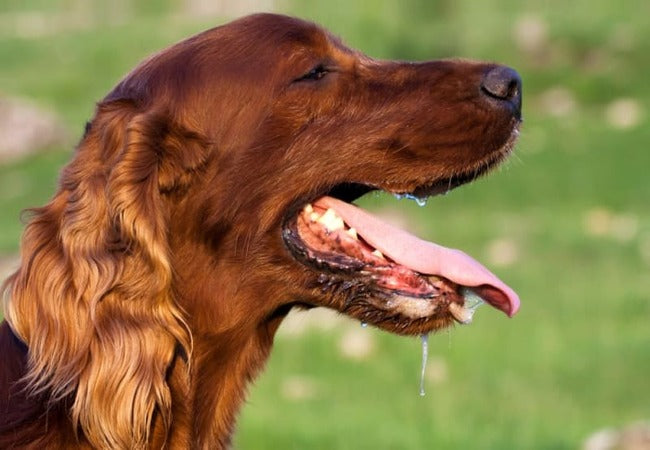Dog Breathing Heavy at Rest? A Vet’s 2025 Guide to Causes, Signs & Relief 🐶💨

In this article
🐶 Dog Breathing Heavy at Rest? A Vet’s 2025 Guide to Causes, Signs & Relief 🩺💨
By Dr. Duncan Houston BVSc
1. Normal vs. Concerning Breathing
Dogs normally breathe 15–30 breaths/min at rest. Panting after exercise or heat—rapid, shallow, open-mouthed—is normal and helps cool them down. Heavy, prolonged, or labored breathing outside these contexts is concerning.
2. What Counts as Heavy or Labored Breathing?
-
Heavy breathing: persistent fast breaths (>35–40 breaths/min) at rest or during sleep
-
Labored breathing (dyspnea): involves stomach/neck muscles, open mouth, nostril flaring, noisy or strained breathing; often an emergency
3. Recognizing the Red Flags
Pay attention if your dog is:
-
Breathing ≥40 breaths/min while resting
-
Using belly muscles or flared nostrils
-
Making noisy or raspy breaths, wheezing, snorting, or gagging
-
Exhibiting restlessness or refusing to lie down
-
Showing coughing, nasal/eye discharge, swelling, collapse, or neck extension
These signs may indicate cardiac, pulmonary, airway, or systemic issues—immediate vet attention is required.
4. Common Causes of Heavy Breathing
A. Physiological / Non-Emergency
-
Heat, humidity, exercise, excitement, stress—expected panting, resolve once cooled or calm
-
Brachycephalic (flat-face) breeds—pugs, bulldogs have narrowed nasal passages, leading to heavy or noisy breathing
-
Dreaming or sleep patterns—puppies or the elderly may breathe heavily during REM sleep
B. Medical Conditions
-
Heatstroke—dangerous; panting with drooling, collapse, discolored gums
-
Obesity—extra weight reduces respiratory efficiency
-
Upper airway problems:
-
Nasal congestion, reverse sneezing, foreign body in throat; sternor/stridor
-
Laryngeal paralysis in older large breeds—stridor, exercise intolerance, risk of aspiration
-
-
Lower airway/lung disease: pneumonia, asthma, bronchitis, cancer—these cause cough, wheeze, discharge
-
Cardiac disease or heart failure—fluid buildup in lungs/heart causes dyspnea, cough, distended abdomen
-
Anemia, metabolic disorder, and toxin exposure can cause rapid breathing with poor color
-
Trauma, pleural effusion, diaphragmatic hernia—impair breathing ability
5. Home Check: Monitor Trends
-
Count breaths/min at rest (without panting)
-
Note environment: hot, post-exercise, stressful?
-
Observe behavior & gums: alert vs lethargic; any color changes
-
Look for discharge, coughing, stumbling, posture changes
-
Track concurrent symptoms (vomit, diarrhea, collapse)
When in doubt, contact your vet for advice. It's better to check early.
6. Veterinary Diagnostics
Your vet will perform:
-
🩺 Full physical exam—lungs, heart, throat, nasal passages
-
🩸 Blood work—CBC, biochemistry
-
🩻 Imaging—X‑ray or ultrasound of chest/abdomen
-
🌬️ Pulse oximetry or blood gas analysis
-
🧪 Specific tests (e.g., coccidiosis, heartworm, thyroid)
7. Treatment Approaches
🫁 For non-emergency causes, vets may suggest cooling, calming, and diet changes.
For medical conditions:
-
Heatstroke: aggressive cooling, IV fluids, monitor
-
Obstruction: remove foreign object; surgery if needed
-
Respiratory disease: antibiotics, steroids, nebulization, inhalers
-
Heart disease: diuretics, ACE inhibitors, medications per heart murmur
-
Laryngeal paralysis: weight loss, surgery (tie-back), oxygen therapy
-
Fluid/blood loss: treat pneumonia, pleural effusion, anemia as needed
Hospitalization and supplemental oxygen are often required for severe cases.
8. Prevention Tips for 2025
-
🏡 Provide shade and water; avoid midday walks during heatwaves
-
🎾 Manage weight and exercise safely
-
🏥 Regular vet check-ups—especially for flat-faced or senior dogs
-
💉 Vaccinate and prevent parasites to reduce lung infections
-
🚫 Keep pets away from smoke, allergens, and pests
-
🧼 Keep nasal passages and throat clear after gardening/play
9. Ask A Vet Support & Tools
-
📱 Ask A Vet App – chat anytime about breathing concerns
-
🛠️ Woopf & Purrz LungCare Kits™ – includes pulse oximeter, breathing tracker chart, calming diffuser
-
🎓 Webinars on airway evaluation, heat safety, and brachycephalic care
10. Final Words 🐾💙
Not all heavy breathing is an emergency—but if it’s persistent, labored, or occurs with other signs (like blue gums, cough, collapse), see your vet now. In 2025, early detection, preventive care, and trusted vet support are key to keeping your dog breathing comfortably 🩺.
Still unsure? Visit AskAVet.com or open our app—your expert is always reachable.


